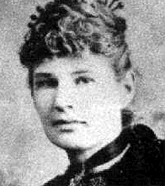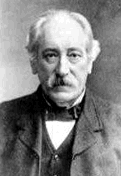|
|

Theosophy and
Mysticism - Anna Kingsford
 Student
of Thesophy, the occult
and mysticism,
doctor, author, women's activist and
vegetarian, Anna (Annie) Bonus Kingsford was born on 16th September, 1846, at Maryland Point, Stratford,
Essex. She was the youngest of twelve children. Her father, John Bonus was a
wealthy London shipbroker of Italian origin and her mother, Elizabeth Ann Schroder,
was of Irish / German descent. When Anna was still a young girl the family moved
south of the Thames to Blackheath, then still a village, near Greenwich. Student
of Thesophy, the occult
and mysticism,
doctor, author, women's activist and
vegetarian, Anna (Annie) Bonus Kingsford was born on 16th September, 1846, at Maryland Point, Stratford,
Essex. She was the youngest of twelve children. Her father, John Bonus was a
wealthy London shipbroker of Italian origin and her mother, Elizabeth Ann Schroder,
was of Irish / German descent. When Anna was still a young girl the family moved
south of the Thames to Blackheath, then still a village, near Greenwich.
Although plagued by illness from an early age Anna was an imaginative and creative
child. She had mystical visions and seems to have possessed some psychic
ability, often predicting impending deaths. She was an avid reader, in
part due to access to her father's library, and would write plays for her dolls
to perform from the stories she read. She wrote a novel Beatrice: a Tale of the Early
Christians which was published when she was just thirteen, and later had some of
her poems published as River Reeds in 1866. The death of her father in
1865 left
the family with a large fortune from which Anna received a trust fund giving her ?700
a year, enough to make her financially independent.
In November of 1867 whilst Anna was
petitioning on the subject of married women's property, she called at the house of a
Miss Florence J. Theobold in Hastings. It was Miss Theobold that introduced Anna to spiritualism and she often visited the house and
took part in s?ances
there. On 31st December of the same year, Anna married her cousin Algernon
Kingsford, an Anglican
curate. Unusually for the time, she put her own conditions on the marriage,
stating that she wanted to be free to follow her own
career and independent beliefs.
The couple had a daughter, Eadith, born on 24
September 1868 at St Leonards. Eadith's conception on their wedding night
brought on a severe asthma attack, after which Anna would remain celibate for
the rest of her life. The couple eventually settled in Atcham, near Shrewsbury
in Shropshire, where Algernon became vicar.
Following the example of her brother
John, Anna became a vegetarian in 1870, and later that year joined the Catholic Church, taking the name Anna Mary
Magdalen Maria Johanna. Though she was certainly drawn by the mystical and
ritual aspects of the Catholic church, this adoption of Catholicism also meant that
she would avoid the responsibilities of an Anglican clergyman's wife.
Women's Rights
Anna continued to write short stories, and produced a pamphlet An
Essay on the Admission of Women to the Parliamentary
Franchise
in 1868, which gained her some attention. Her concern over women's rights was such
that she became an eloquent public speaker on the subject, promoting equal education for girls and boys, and
the training and recognition of female doctors. In 1872 she bought and edited
the Lady's Own Paper, which protested against vivisection and fought
for women's rights. However, as Anna refused to accept advertising that went against
her principles, the paper ran into debt and closed after two years.
Nevertheless, her publishing venture had made her known in London and provided an introduction to a variety of like-minded progressive women, including Florence Miller, who described Mrs. Kingsford as 'the most faultlessly beautiful woman I ever beheld'.
To help in her fight for the causes
in which she believed, and to make changes from within the profession, Anna decided to become a
medical doctor. At the time women were not allowed to qualify as
doctors in Britain, but she was allowed to begin her studies there, which she did in
1873. The following year she went to Paris for the main part of the course and despite
enormous opposition from both men and women, received her M.D in 1880, and thus
became one of the first female British doctors, after Elizabeth Garrett Anderson
(who had received her M.D from Paris in 1870). The Perfect Way in
Diet, based on Anna Kingsford's doctoral thesis on vegetarianism, was published
in 1881 and soon became the standard text on the subject.
In 1873, after reading a novel called By
and By: An Historical Romance of the Future, Anna began corresponding with
its author Edward Maitland (1824-1897). As well as a novelist and spiritual
writer, Maitland had been a Forty-niner
in the California gold rush and a land commissioner in Australia. After finding
they had much in common on mysticism and spiritual matters the two arranged to meet in a London
art gallery in 1874.
Mystical Visions
Maitland visited Anna and her husband
in Shropshire later that year and it seems that her husband Algernon did not
object to the spiritual couple's close platonic relationship. Both Anna and
Edward had mystical visions and dreams, Anna usually being in contact with the
spirit world during sleep. The two collaborated in writing down, under the influence of direct spiritual
guidance, Anna's 'illuminations' as they called them.
 She began to lecture based
on these illuminations in 1881 and the following year the lectures were
published under the title The Perfect Way, which was to become the major
work of this extraordinary couple. At the time The Perfect Way, which
explored the deeper Mysteries of religion, was extremely well-received and
regarded as the most important modern book of esoteric wisdom and mysticism ever published.
When Samuel Liddell MacGregor Mathers, one of the founders of the legendary
magical order 'The Hermetic Order of the Golden Dawn', later published The Kabbalah Unveiled,
he dedicated it to Anna and Edward. The couple described their work as 'Christian pantheism' and
investigated the esoteric significance of biblical stories and symbolism. They
were also heavily influenced by Egyptian, Greek and Roman myths, and by the
Jewish mystical system of the Kabbalah. They would often visit the British
Museum together and research into subjects such as Neoplatism, Gnosticism and
Hermeticism, Anna discovering that this study supported the knowledge she was
receiving in her illuminations. She began to lecture based
on these illuminations in 1881 and the following year the lectures were
published under the title The Perfect Way, which was to become the major
work of this extraordinary couple. At the time The Perfect Way, which
explored the deeper Mysteries of religion, was extremely well-received and
regarded as the most important modern book of esoteric wisdom and mysticism ever published.
When Samuel Liddell MacGregor Mathers, one of the founders of the legendary
magical order 'The Hermetic Order of the Golden Dawn', later published The Kabbalah Unveiled,
he dedicated it to Anna and Edward. The couple described their work as 'Christian pantheism' and
investigated the esoteric significance of biblical stories and symbolism. They
were also heavily influenced by Egyptian, Greek and Roman myths, and by the
Jewish mystical system of the Kabbalah. They would often visit the British
Museum together and research into subjects such as Neoplatism, Gnosticism and
Hermeticism, Anna discovering that this study supported the knowledge she was
receiving in her illuminations.
Anna was also
involved with her many other of her interests. Apart from an active social life she was
running her own medical practice in London, campaigning for vegetarianism and
protesting against vivisection with lecture tours in Britain and abroad, and
writing pamphlets, articles and letters. She had such strong feelings against vivisection
that she apparently tried cursing the doctors involved in the practice, at least one of whom, Professor Claude Bernard,
died shortly afterwards. Whatever the truth of this story, she soon developed serious health
problems of her own. On 17 November, 1886, whilst visiting Louis Pasteur's laboratory in Paris to
obtain evidence for her campaign against his abuse of animals, Anna was caught in
heavy rain which brought on consumption. One of her friends, Lady Isabel Burton,
wife of the famous explorer, spent much of her time in Paris in January 1887, helping to nurse
Anna,
as she was by now dying of consumption
and, as Richard Burton wrote, 'suffering in mind and soul . . . at the sights and
sounds connected with Parisian vivisection.'
Part 1
| Part
2
Copyright 2005
by Brian Haughton. All Rights Reserved.
|